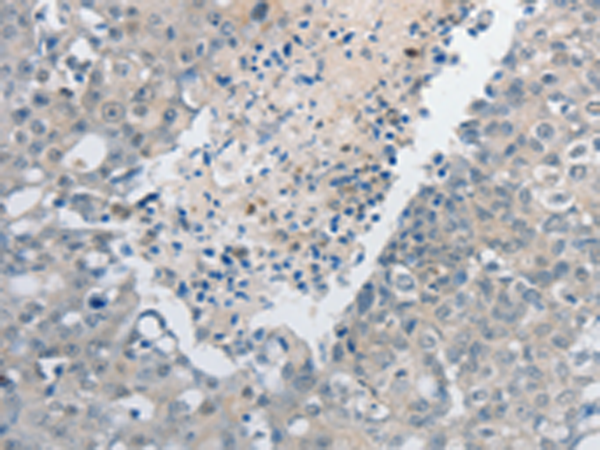

| WB | 咨询技术 | Human,Mouse,Rat |
| IF | 咨询技术 | Human,Mouse,Rat |
| IHC | 1/5-1/20 | Human,Mouse,Rat |
| ICC | 技术咨询 | Human,Mouse,Rat |
| FCM | 咨询技术 | Human,Mouse,Rat |
| Elisa | 1/1000-1/5000 | Human,Mouse,Rat |
| Aliases | GCH, DYT5, DYT14, DYT5a, GTPCH1, HPABH4B, GTP-CH-1 |
| WB Predicted band size | 28 kDa |
| Host/Isotype | Rabbit IgG |
| Antibody Type | Primary antibody |
| Storage | Store at 4°C short term. Aliquot and store at -20°C long term. Avoid freeze/thaw cycles. |
| Species Reactivity | Human |
| Immunogen | Synthetic peptide of human GCH1 |
| Formulation | Purified antibody in PBS with 0.05% sodium azide and 50% glycerol. |
+ +
以下是关于GCH1抗体的参考文献示例(注:以下内容为模拟示例,实际文献需通过学术数据库查询验证):
---
1. **文献名称**: *"GCH1 Antibody Specificity and Application in Neuropathic Pain Models"*
**作者**: Tegeder, I. et al.
**摘要**: 该研究通过Western blot和免疫组化验证了GCH1抗体的特异性,发现其在背根神经节中的表达与神经性疼痛模型中BH4水平相关。抗体成功检测到GCH1蛋白在炎症条件下的表达上调,支持其在疼痛机制研究中的应用。
2. **文献名称**: *"Endothelial Dysfunction and GCH1 Downregulation in Cardiovascular Disease"*
**作者**: Antoniades, C. et al.
**摘要**: 研究利用GCH1抗体分析人内皮细胞中GCH1蛋白的表达,发现其下调导致BH4合成减少,引发一氧化氮合酶解偶联,与动脉粥样硬化和高血压相关。抗体特异性通过siRNA敲低实验验证。
3. **文献名称**: *"GCH1 Expression in Dopaminergic Neurons: Implications for Parkinson’s Disease"*
**作者**: Zhao, Y. et al.
**摘要**: 通过免疫荧光和GCH1抗体标记,研究发现帕金森病模型中黑质区GCH1蛋白水平显著降低,提示BH4代谢异常可能参与多巴胺能神经元退化,为疾病机制提供新见解。
4. **文献名称**: *"Development of a Polyclonal GCH1 Antibody for Immunohistochemical Analysis"*
**作者**: Daly, S.B. et al.
**摘要**: 文章描述了一种兔源多克隆GCH1抗体的制备与验证,该抗体能特异性识别人类和小鼠组织中的GCH1蛋白,适用于冰冻切片和石蜡切片的检测,为临床病理研究提供工具。
---
**提示**:实际文献需通过PubMed、Google Scholar等平台检索关键词“GCH1 antibody”“GCH1 immunoblotting”或结合具体研究领域(如疼痛、心血管疾病)进一步筛选。部分研究可能侧重于抗体开发或特定疾病的GCH1蛋白检测应用。
×